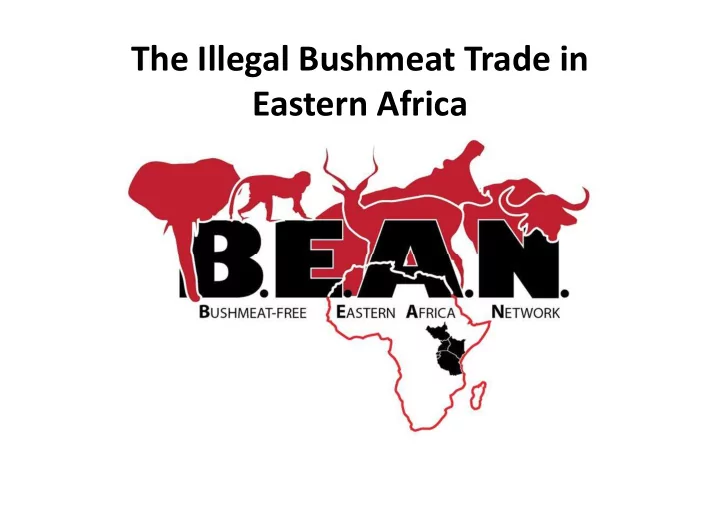

The Illegal Bushmeat Trade in Eastern Africa
Bushmeat The bushmeat trade is the illegal overhunting of wildlife for meat and income.
Bushmeat Challenges Wildlife across Eastern Africa is declining rapidly both inside and outside protected areas.
Demand for protein and income derived from wildlife is driven by : • rapidly increasing human populations, • poverty, • political instability, • inadequate law enforcement, • inadequate awareness or transparency • inadequate awareness or transparency
MENTOR ( Mentoring for Environmental Training in Outreach and Resources conservation ) Fellowship Program on illegal bushmeat exploitation in eastern Africa in eastern Africa www.mentorfellowshipprogram.org
Map of Eastern Africa
Bushmeat Assessments April – May 2008 conducted by eight MENTOR Fellows • Multiple methods applied • Kenya, Southern Sudan, Tanzania and Uganda • Aim to identify and evaluate current bushmeat trade, • National Assessments potential solutions & partners potential solutions & partners • Site Level Assessments • Site Level Assessments
Bushmeat in Eastern Africa In Kenya, bushmeat hunting is widespread in and around protected areas as well as on private land. Snare hunting is widespread. Wildlife policy is under review and going by the current debate, this is no sign that bushmeat management will be given the bushmeat management will be given the attention it deserves. In Uganda, studies have shown declines in wildlife populations in protected areas due to hunting. Understanding of wildlife laws and value require revision.
In Tanzania, trophy and subsistence hunting is legally allowed in wildlife areas outside of national parks. This type of consumptive utilization is controlled through quotas and permits, however with limited capacity to manage illegal hunting. In Southern Sudan, hunting with rifles is widespread where many citizens rely on bushmeat for protein and where many citizens rely on bushmeat for protein and income with limited capacity to manage over-hunting.
Commonalities and Differences Commonalities • Inadequate awareness (diseases, wildlife laws, impact of bushmeat) across the region • Inadequate enforcement of laws, capacity and technology • Decreasing wildlife population • Decreasing wildlife population • Common drivers • Common hunting tools • Inadequate collaboration among stakeholders Differences • Values of wildlife from legal perspectives • Policies and laws
Strategies to Address the Eastern Africa Bushmeat Trade Conceptual Model
Bushmeat Solutions Alternatives for both protein and income are essential to change current trends in illegal, over-hunting of wildlife.
Enhanced awareness by individuals and institutions on how the illegal and unsustainable bushmeat trade will impact future economics and ecology of their livelihoods.
Improved policy, legislation and regulation of legal wildlife use is necessary if future generations of citizens in Africa will be able to have wildlife as part of their heritage to pass on to the next generation.
Partnerships that bring together government authority, private industry, non-profit organization and local community ingenuity and effort can assure the future of wildlife populations in Africa and the many services they provide.
A change in awareness, behavior and responsibility must be developed among all sectors of society to address this important conservation and cultural challenge.
www.bushmeatnetwork.org
Contact Photo credits: Photo credits: USAID Ephraim Mwangomo Michael Gelman Evanson Kariuki Peter Amum College of African Wildlife Management, Mweka WWF-US Heather Eves
Thanks! We look forward to your participation in addressing bushmeat issues.
Recommend
More recommend